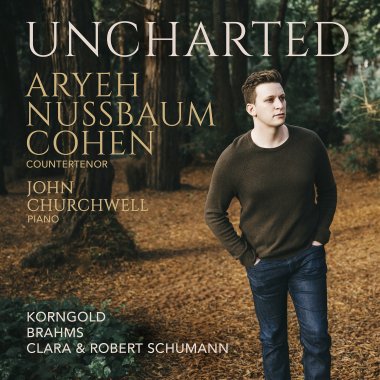
Lieder recordings by countertenors are not a new thing, but these albums are so few and far between that each generates the frisson of a unique event. To this small and exciting catalog, we can now add Aryeh Nussbaum Cohen’s Uncharted with pianist John Churchwell (Avie Records).
Uncharted is a homegrown effort. Nussbaum Cohen lives in Oakland, Churchwell is head of music staff at San Francisco Opera, and recording engineer David v.R. Bowles (of Swineshead Productions) hails from Berkeley.

To his credit, Nussbaum Cohen is not one to shy away from challenges. Rather than record the Baroque repertoire that propelled him to international fame, he embraces Erich Wolfgang Korngold’s Lieder des Abschieds (Songs of farewell), four songs by Brahms, four others by Clara Schumann, and Liederkreis, Op. 39, by Robert Schumann. For an encore of sorts, Nussbaum Cohen ends with Robert’s beloved “Der Nussbaum” (The nut tree). None of these songs has been previously recorded by a countertenor.
Unfortunately, all does not go smoothly in the vocal department. In the few high passages he sings on Uncharted, Nussbaum Cohen lets his voice bloom gorgeously. But the vast majority of the repertoire — at least in the keys he has chosen — sits lower in his range, where his voice sounds shallow and unresonant, while the midrange grows bigger, if not consistently beautiful.
There are also several basic issues with vocal production. Take, for example, Robert Schumann’s heavenly “Mondnacht” (Moonlit night). “It was as though Heaven had softly kissed the earth,” the song begins, holding the moonstruck lover spellbound. Countless great singers have tackled this song. Those who interpret it successfully share some common strengths: effortlessness, consistent tonal beauty across registers, impeccable legato, and an individual voice. Some of the best sing as though transported, as if the voice were a gentle cloud of sound, gliding through the air.
Nussbaum Cohen falters on these counts. His voice doesn’t float effortlessly but rather sounds a mite dry, especially at the bottom of the range. The legato only goes so far, with too many phrases artificially broken by overemphasized consonants. There are also a few unnecessary inhalations. Add in a tendency to swell on the last word in a phrase, and you end up with moonlight obscured by clouds.
It’s also fair to ask what has become of the questioning and drifting quality essential to “Der Nussbaum.” “They whisper, two by two, together, inclining, bending, gracefully, to kiss their delicate heads,” the artist sings. “They whisper. Who can understand so soft a song?” In this interpretation, there is no mystery, let alone the whisper essential to putting this song over.
For contrast, listen to the vocal refinement in David Daniels’s flawless performance of Schubert’s “Der Tod und das Mädchen” (Death and the maiden) and Philippe Jaroussky’s recording of Schubert's “Im Abendrot” (In evening’s glow). These are unique countertenors whose carefully cultivated vocal personalities and superb technique elevate their artistry far beyond the commonplace.




